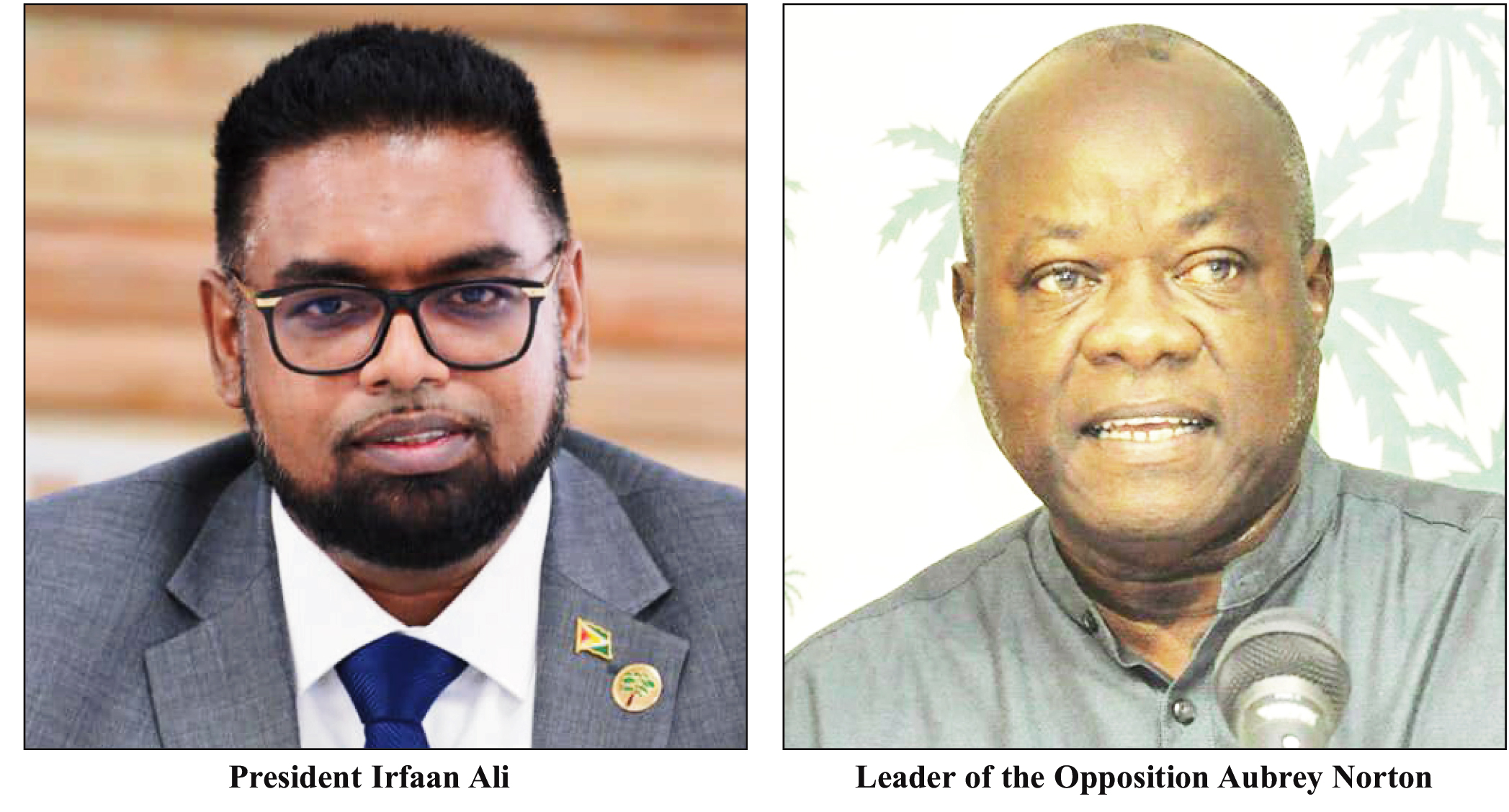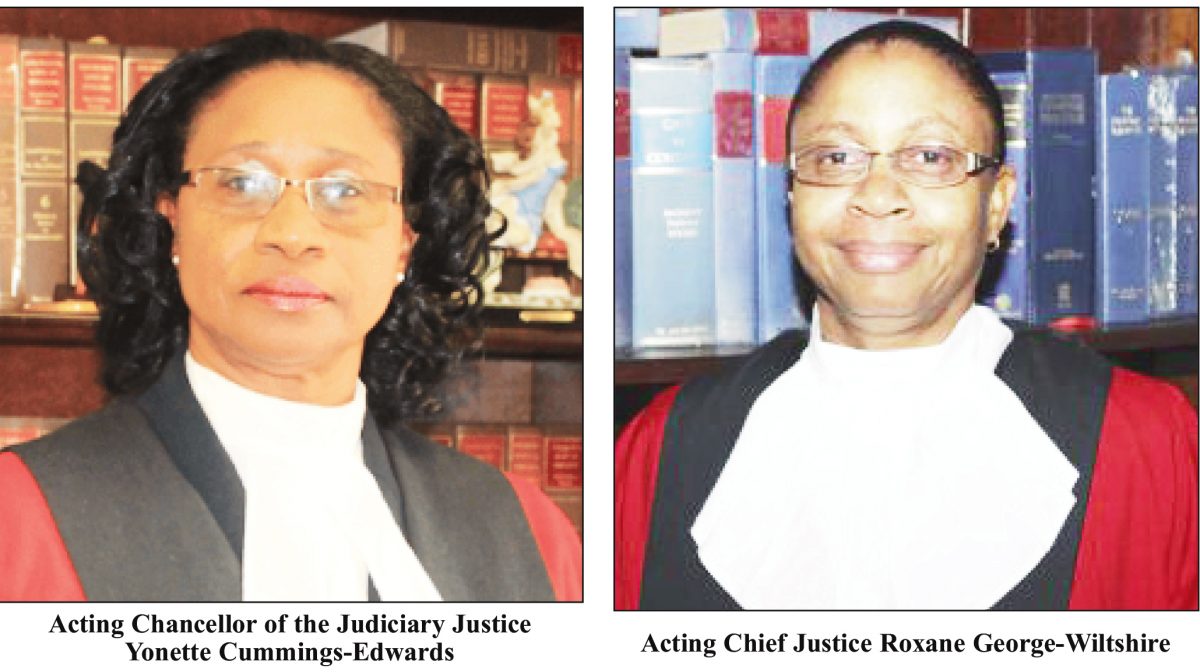With President Irfaan Ali yet to initiate the consultative process for the appointment of a Chancellor and Chief Justice, Leader of the Opposition Aubrey Norton has formally written to the President informing him of his agreement with the confirmation of Justices Yonette Cummings-Edwards and Roxane George Wiltshire to the top judicial posts.
Justice Cummings-Edwards and Justice George Wiltshire SC were respectively appointed acting Chancellor of the Judiciary and Chief Justice back in 2016 and 2017—weeks after the retirement of then acting Chancellor Carl Singh, who was also never confirmed despite having served for 12 years. Guyana has not had a confirmed Chancellor for 17 years.

Observers have been left questioning when the right time will come since there has been a stalemate in the process for almost two decades.
Yesterday, Norton informed the media that he has written, through shadow Minister of Legal Affairs Roysdale Forde, to the Minister of Parliamentary Affairs and Governance, Gail Teixeira formally outlining his position on the appointments.
The letter stated, “…Leader of the Opposition Mr Aubrey C Norton wishes to inform you that he is in agreement that Justice Yonette Cummings be appointed Chancellor of the Judiciary and Justice Roxane George Wiltshire be appointed Chief Justice in keeping with Article 127(1) of the Constitution.”
Article 127 (1) of the Constitution stipulates that “the Chancellor and the Chief Justice shall each be appointed by the President, acting after obtaining the agreement of the Leader of the Opposition.”
“Please be assured that whenever the President is ready to appoint these two learned women to the positions of Chancellor and Chief Justice he has the unconditional agreement of the Leader of the Opposition,” the letter concluded.
Norton, at his weekly press conference yesterday, said that he has now fulfilled his constitutional responsibility and it is now up to the President to make the next move.
Traditionally, it is the President that proposes the names of the persons to be appointed to the top judicial posts and the Opposition Leader either agrees or disagrees. In this case, Ali has not yet proposed any names nor started the consultative process aimed at arriving at the names.
In January of 2018, then President David Granger had informed then Opposition Leader Bharrat Jagdeo that his choice for Chancellor of the Judiciary was then Belizean Chief Justice, Guyana-born Kenneth Benjamin while acting Chancellor Cummings-Edwards was his nominee for Chief Justice.
The two leaders met and Jagdeo had later refused the nominations and there was some back and forth in the public between the two leaders. However, no substantial move was made to either further deliberate on the nominations or put forward new names.
Granger was not ready to reconsider his nominees and had told reporters that he had set in motion a process which began with a public advertisement. “Everyone who was interested in either of those two posts applied,” he said, before explaining that thereafter he established a panel of seniors who interviewed all of the applicants.
He had reminded that the panel produced a report with “certain” recommendations and on the basis of those recommendations he met with Jagdeo to propose the two nominees.
In a letter dated May 12, 2022, and addressed to Minister of Parliamentary Affairs and Governance Teixeira, Norton signalled his intention to agree to confirm the appointment of the two justices. However, Teixeira had informed that it was the President’s prerogative as to when and how he approaches the subject of the appointment of the Chancellor and Chief Justice.
On Friday, Stabroek News posed a question on the reluctance to further the constitutionally-mandated consultations between the Opposition Leader and Ali which the President initially brushed aside.
However, he circled back saying “We have no issue appointing [a Chancellor and Chief Justice]. When the right time comes we will have the consultation on Chancellor and Chief Justice. The [May 13, 2022] consultations were on the Commissions the President asked for consultations on.”
This is the first time Ali has publicly spoken about the judicial appointments.…in his court
“I’m saving the President the trouble of having to ask for agreement [on the appointments]. The Constitution says in [Article} 127 (1) that he needs the agreement of the Opposition [and] what I’ve done is to remove any barrier whatsoever. I’ve made it clear through the representative in this letter that I am in agreement once it is the appointment of the Chancellor and the Chief Justice.
“There is no stumbling block left. Any decision not to appoint them will now rest squarely with the President because I’ve publicly said go ahead and I’ve put in writing to him that I am in agreement with the appointment of Justice Cummings-Edwards and Justice George-Wiltshire so the path is clear for their appointment,” Norton told reporters yesterday.
He said that he found it strange that the issue of the appointments did not form part of their May 13 meeting. He reminded the issue was raised in correspondence with Teixeira but the government refuses to budge.
“My own view based on my assessment of the people of Guyana is that they want them [Justices Cummings-Edwards and George-Wiltshire] appointed and so I decided that I will put it in writing and close all options to suggest that I’m not prepared to. So it is now out there, a formal letter stating that the President can go ahead, removing him having to engage me to say I’m appointing the two [judges],” he said.
He added “…remember the legislation doesn’t speak to meaningful consultation, it speaks to agreement. The President and the Opposition Leader have got to agree. I have indicated that I agree based on the knowledge and all the information at my disposal and that the President could go ahead and appoint the Chancellor and the Chief Justice. The ball is now in his court.”
The Opposition Leader explained that both Justices boast impeccable records and have adjudicated matters fairly. He added that his support of their confirmations was expressed only after consultation with Coalition partner and Leader of the Alliance For Change Khemraj Ramjattan.
“Society seems to agree that the two learned women are equipped. They have served [and] they have ruled in different directions, so I don’t think they can be accused of being partisan to one political party or the other and so in this circumstance, it is my sincere view that they have what is required to be Chancellor and Chief Justice,” Norton proffered.
In April, civil society group Article 13 called for the immediate confirmation of Justices Cummings-Edwards and George and said that the onus is on President Ali to initiate the process.
Providing background on the current stalemate, Article 13 noted that Justice of the Court of Appeal Carl Singh retired in 2017, having acted as Chancellor from 2005, a period of twelve years. Justice Ian Chang demitted office in February 2016, having served as acting Chief Justice from 2010. Neither was confirmed at the dates of their retirement. Justices Cummings-Edwards and George have been functioning as acting Chancellor and acting Chief Justice from 2016 and 2017 respectively, to the present.
The group pointed out that under the 1966 Independence Constitution, it was the Governor General who had the power to appoint the Chancellor and the Chief Justice “on the recommendation of the Prime Minister after consultation with the Leader of the Opposition”. The 1980 Constitution discarded the office of Governor General and transferred its appointing powers to the Executive President after consultation with the Minority Leader. A later amendment made as part of the Constitutional Reform process under the Herdmanston Accord, required “agreement” between the President and the Leader of the Opposition. Article 127 A of the Constitution now vests in the President the power and the duty to appoint a Chancellor and a Chief Justice “after obtaining the agreement of the Leader of the Opposition.”
Prior to Article 13’s statement, the current President of the CCJ, Justice Adrian Saunders called the failure to appoint the top judicial officers a “notable stain on Guyana’s judicial landscape”.
“There is one significant blot on an otherwise impressive Guyanese legal and judicial landscape. For the country to have not appointed a Chancellor for 17 long years is very disappointing; likewise, to be without an appointed Chief Justice for several years. As the President of your final court, I believe I have a right and a duty publicly to express the view that Guyana should not let this year pass and not remedy this regrettable situation,” he said.
Justice Saunders was at the time delivering the keynote address to members of the legal fraternity during a dinner hosted by the Guyana Bar Association (GBA) at the Marriott Hotel.
In addition to calling for the appointment of a Chancellor and Chief Justice, the GBA has also called for a change in the formula for the appointment noting that the current one is clearly not working.





